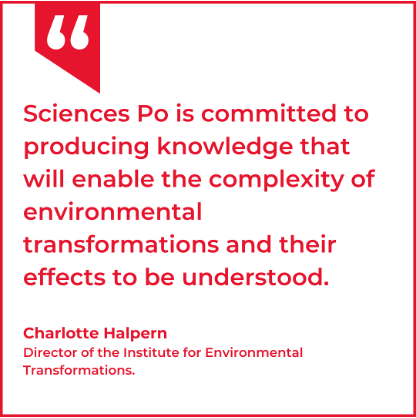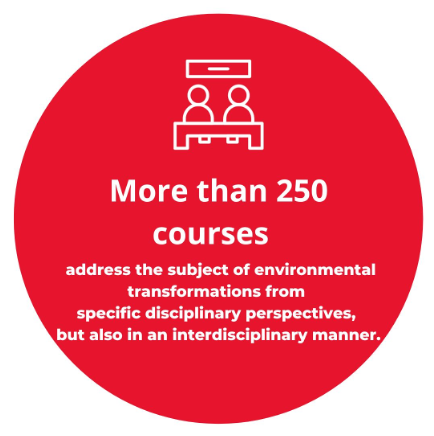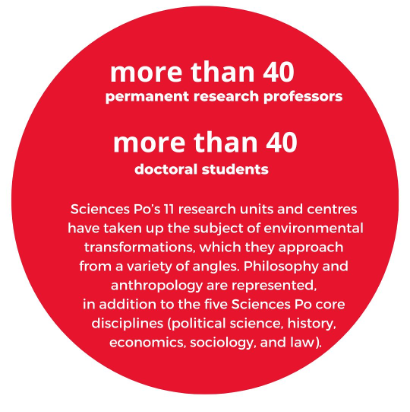Sciences Po launches its Institute for Environmental Transformations
Paris, 7 November 2023 – Under the leadership of its Director, Mathias Vicherat, Sciences Po is placing environmental transformations at the centre of its strategic plan, academic objectives and research activities.
The Institute for Environmental Transformations, launched on 6 November 2023, gives new impetus to Sciences Po's objective of becoming the leading European university in the field. The Institute will promote Sciences Po's unique academic model by giving visibility and coherence – both in France and internationally – to existing initiatives and programmes. It will also facilitate the expansion of our teaching and research by fostering a cross-disciplinary scientific approach.
Sciences Po occupies a unique place in public debate, at the heart of the community; we are motivated by the desire to provide concrete responses to contemporary challenges and the expectations of future generations – to ‘understand our times, make a difference’. The Institute for Environmental Transformations will take a decisive role in disseminating and promoting new knowledge.
 “Major upheavals are underway and the need to respond to them is urgent. It is the responsibility of a university that trains decision makers in public policy and corporate strategy to stimulate fresh ways of thinking and questioning, and to develop new conceptual apparatus and analytical models. The Institute for Environmental Transformations is designed to contribute to public debate through a new policy of training and research, disseminating and promoting knowledge. Our ambition is threefold: to meet the aspirations of new generations; to understand our times and make a difference; and to transform our students' convictions into the ability to implement action.” – Mathias Vicherat, Sciences Po Director.
“Major upheavals are underway and the need to respond to them is urgent. It is the responsibility of a university that trains decision makers in public policy and corporate strategy to stimulate fresh ways of thinking and questioning, and to develop new conceptual apparatus and analytical models. The Institute for Environmental Transformations is designed to contribute to public debate through a new policy of training and research, disseminating and promoting knowledge. Our ambition is threefold: to meet the aspirations of new generations; to understand our times and make a difference; and to transform our students' convictions into the ability to implement action.” – Mathias Vicherat, Sciences Po Director.
The Institute was created as part of the TIERED project (Transforming Interdisciplinary Education and Research for Evolving Democracies), winner of the ExcellencES call for projects under the 4th Investments for the Future programme, alongside its partners: CNRS, IFREMER, INED, INRIA, INSERM, INALCO, Paris Cité University and IDDRI.
TIERED was launched in January 2023, with 10 years’ funding [1], in response to the challenges facing democratic systems in a context of environmental transformations and profound social change. It marks a new stage in the university's development in terms of teaching, research, and the dissemination of knowledge.
The Institute's initiatives with regard to environmental transformations will also benefit from dedicated fundraising and sponsorship campaigns.
The activities covered include: building research initiatives with our partners; taught courses; dual degrees; recruitment of lecturers and post-doctoral students; hosting visiting professors; dissemination and promotion of knowledge in the community; and involvement in major networks (U7+ Alliance, GAUC) to raise the profile of the actions taken by research and education establishments in support of the Paris Climate Agreement (COP 21).
The Institute is headed by Charlotte Halpern, PhD in political science and researcher at Sciences Po's Centre for European Studies and Comparative Politics.
It will rely on an internal steering committee, which will liaise with all Sciences Po communities and support Sciences Po's transformation, and two other governing bodies:
- an academic advisory board comprising members of Sciences Po’s permanent faculty, representatives of the CNRS, TIERED project partners and international experts.
- a stakeholders’ council chaired by the world-renowned scientist Jean Jouzel, bringing together elected representatives, institutions, companies, associations/charities/non-profits, NGOs, students, and distinguished figures.
The Institute is also a member of the TIERED project management body, and presents its work to the partners committee.
 “The creation of the Institute for Environmental Transformations is a tremendous opportunity for Sciences Po to develop and intensify the efforts of the past 15 years in response to the major challenge that the environmental crisis represents for democratic societies. Sciences Po is committed to producing knowledge that will enable the complexity of environmental transformations and their effects to be understood, meeting the need to train high-level professionals, and being proactive in offering original and adaptable solutions in the face of the difficult choices that lie ahead.
“The creation of the Institute for Environmental Transformations is a tremendous opportunity for Sciences Po to develop and intensify the efforts of the past 15 years in response to the major challenge that the environmental crisis represents for democratic societies. Sciences Po is committed to producing knowledge that will enable the complexity of environmental transformations and their effects to be understood, meeting the need to train high-level professionals, and being proactive in offering original and adaptable solutions in the face of the difficult choices that lie ahead.
The singularity of this Institute is based on three strong markers: proposing an ambitious transformation agenda to accompany the change in how we envisage knowledge production and the education of future generations; promoting the contribution of the humanities and social sciences to enable contemporary societies to operate in a ‘just and safe’ space, while responding to the persistent problems they face; relying on solid partnerships to enable increased exchanges with other science sectors.” – Charlotte Halpern, Director of the Institute for Environmental Transformations.
[1] Almost €16m in funding is managed by the French National Agency for Research (ANR), under the France 2030 programme, reference ANR-22-EXES-0014.
SCIENCES PO, EUROPE'S LEADING UNIVERSITY ON THE CHALLENGES OF ENVIRONMENTAL TRANSFORMATIONS
The launch of the Institute for Environmental Transformations provides fresh stimulus and a new context for the far-reaching objective to renew teaching and research at Sciences Po, in order to take better account of the challenges environmental transformations present.
Teaching
 More than 250 courses address the subject of environmental transformations from specific disciplinary perspectives, but also in an interdisciplinary manner.
More than 250 courses address the subject of environmental transformations from specific disciplinary perspectives, but also in an interdisciplinary manner.
These are complemented by a number of methodology courses focusing on specific sources (major surveys, archive collections, public reports, legal texts, etc.).
At the Undergraduate College
A mandatory “Ecological Culture” course was introduced in January 2023. It is taught in French and English on the seven campuses (Paris, Dijon, Le Havre, Nancy, Menton, Poitiers, Reims), to all first-year Undergraduate College students, introducing them to the challenges of environmental transformations. Engaging all the disciplines that structure the Sciences Po curriculum – political science, history, economics, sociology and law – this course will also open up to other areas of science, such as natural sciences and life sciences, health studies and engineering. It is divided into two parts:
- 18 hours of intensive lectures during one week in January;
- Six hours of supplementary teaching provided during the first five weeks of the spring semester by academics and scientists from the life and natural sciences, through general lectures addressing specific environmental issues, in connection with public policy debates.
In the Graduate Schools (Master's level):
The question of impact has been placed at the heart of Sciences Po's educational approach and taught courses. It has guided the work carried out over the past few years on Master's degree curricula to ensure we are able to offer students courses that meet their aspirations for commitment and action in the face of major contemporary challenges.
School of Public Affairs:
- A specialisation in Energy, environment and sustainability is available to students in the European Affairs Master's programme and the Public Policy Master's programme.
Paris School of International Affairs (PSIA):
- Master in Environmental Policy
- Master in International Energy Transitions
- PSIA offers cross-disciplinary specialisations, including Environment and Sustainability and Food and Agriculture
Urban School:
- Master in Governing Ecological Transitions in European Cities, launched in 2020–2021
School of Management and Impact:
- Introduction in 2023–2024 of a joint course in the M1 year, which focuses on the environmental and social impact of companies, and on understanding the role of data. The social sciences have a capacity to shed light on the links between business, the environment and society.
- Three Master's programmes are evolving to address this impact in all its dimensions that are in line with the new orientations of the professional sectors targeted:
- Finance and Strategy
- International Business and Sustainability
- HR and Sustainable Governance
- More broadly, each of the School of Management and Impact's Master’s programmes will offer in-depth courses on environmental and transition issues (impact measurement, carbon footprinting, sustainable finance and green bonds, sustainable governance, etc.).
- Launch of the Impact Studio in May 2023: co-constructed with the Centre for Entrepreneurship and in partnership with Accenture, the Impact Studio is both a teaching programme and a proactive support system. It aims to train students in the research and development of impact-based business models. Its ambition is to bring together students, academics, international institutions and companies around sustainable business models.
School of Journalism:
- In M1: the “Politics of the Earth” course is mandatory from the first semester. Students attend practical journalism workshops on the coverage of climate issues in the second semester, leading to the publication of articles on the “Acclimater” (“Acclimatise”)
- In M2, three initiatives have been launched: the podcast series "Atterrir” ("Landing”); an intensive week of special reports live from the Paris International Agricultural Show; and the "Heat Up” international consortium survey on the impact of global warming on workers' health (explanatory video ).
Law School:
- The Law School’s ‘clinic’, through its dedicated focus on environmental justice and ecological transition (JETE), is an original teaching programme, combining theoretical courses and practical internships in equal measure. It complements the law courses on environmental transformations to provide a contextual approach adapted to the requirements of contemporary legal practice, and an opening up to multidisciplinarity and transnational dynamics.
The School of Research:
- Master's programmes at the School of Research include courses designed to train upcoming young researchers in the study of environmental transformations by introducing them to methods that facilitate a scientific understanding of these new phenomena. Courses include Nature and History in Political Thought, Topics in Public, Health and Environmental Economics, and Introduction to Environmental History.
- Environmental transformations also infuse students' research work, with 20–30% of dissertations defended at the School of Research focusing on one or more contemporary environmental transformations.
Dual degrees:
Several dual degrees are interdisciplinary and open to other areas of science.
At the Undergraduate College:
- BASc (Bachelor of Arts and Sciences) on the Reims campus, in partnership with the University of Reims Champagne-Ardenne, in humanities, social sciences and life sciences, on the theme of “Environment, society and sustainability”.
- BASc on the Paris campus, in partnership with the Institut de Physique du Globe de Paris (IPGP), University of Paris in humanities, social sciences and earth sciences, in “Earth Policies”.
In the Schools offering Master's programmes:
- Dual degree with AgroParisTech (PSIA, EAP, EMI, Urban School);
- Dual degree with Sorbonne University (PSIA): Environmental science and policy.
Sciences Po graduates:
The 2023 Graduate Employability Survey on the class of 2021 reveals that 51% of graduates in employment have assignments that incorporate social and environmental responsibility issues.
Of these, 93% feel that their training at Sciences Po enabled them to acquire the knowledge they needed to understand these issues.
Research
 Key figures:
Key figures:
More than 40 permanent research professors work on the study of environmental transformations. They are spread across all research centres and departments. The list of researchers working on environmental issues is available on the Sciences Po research directory.
Over the next few years, approximately 30 academics specialising in environmental issues will join the teaching and research staff already working in this field.
More than 40 doctoral students are either working directly on these issues, or are incorporating them into their research programmes.
10 post-doctoral researchers have been recruited in 2023 for a three-year period with the Bruno Latour Fund: Pia Bailleul, Camille Besombes, Inès Calvo, Bastien Cabot, Anastasiya Halauniova, Gustav Kalm, Thomas Kayzel, Oda Nedregard, Cassandre Rey-Thibault, Emelyn Rude.
Research topics:
Sciences Po’s 11 research units and centres have taken up the subject of environmental transformations, which they approach from a variety of angles. Philosophy and anthropology are represented, in addition to the five Sciences Po core disciplines (political science, history, economics, sociology, and law).
Major research themes:
- Climate change policy, energy policy, and environmental policy
- Environmental health, health and environmental risk management, and analysis of public action in the fields of health and the environment
- Environmental policy and conflict
- Systems of thought and management of the natural environment, the place of ecology in the democratisation process, and political and ecological crises
- Climate and environmental economics, environmental economics, applied environmental macroeconomics, interactions between energy, and economics and the environment
- Political ecology, and political ecology of urban infrastructures
- Activism, sociology of environmental NGOs, and anti-advertising and responsible consumption movements
- Social inequalities and the environment, and environmental change and social issues
- Environmental law, law of the Anthropocene, and environmental ethics
- Environmental history
Examples of theses in progress
- Law:
- The origins of international biodiversity law (1789–1939)
- Refracting the law: how solar geoengineering could change science and the law
- Economics:
- Economic analysis of the consequences of nuclear accidents
- Political Science:
- Climate policies and the geography of attitudes and perceptions: an obstacle to the success and acceptability of the low-carbon transition in Europe?
- A climate of conflict? A comparative study of national elected representatives' responses to climate change in four European countries
- The construction of Chinese polar policy. A geopolitical challenge for the international governance of the poles in the 21st century
- The energy community movement in an urban context
- Social and political life of biological crises in the Congo River Basin and eastern Democratic Republic of Congo
- Sociology:
- Intermediaries of the environmental cause. The structuring of a legal offer in the field of environmental law from 1970 to the present day in France
- Going public with data: a comparative study of mobilisations against air pollution in Paris and Buenos Aires
- Delegating to go green? Changes in agricultural work and ecological transition policies
- History:
- Forests and Power in United States Empire 1891–1914
Since 2018, the Interdisciplinary Environmental Research Workshop (AIRE) has been building an interdisciplinary research collective to share and disseminate environmental research conducted at Sciences Po, to cut across disciplines in the humanities and social sciences, and to initiate debate on research approaches and practices relating to this subject.
Initiatives involving disciplines other than the humanities and social sciences:
In addition to supporting the development of a dynamic research community, the Institute for Environmental Transformations carries out coordination activities, provides visibility, and develops links beyond the social sciences and humanities:
- The Earth Politics Centre, created in 2019 with Université Paris Cité as a continuation of the Politics of the Earth programme established by Bruno Latour, works on the necessary convergence of the natural and experimental sciences with the humanities and social sciences to study the complex issues of the Anthropocene. This initiative has opened the door to other areas of science, with the support of IDEX.
- In 2020, the LIEPP (Interdisciplinary Research Centre for the Evaluation of Public Policies) created a dedicated environmental policy unit to strengthen evaluative research on governance and public policies for ecological transition.
Initiatives to disseminate and promote knowledge:
- The European Chair in Sustainable Development and Climate Transition, created in 2020 and headed since 2022 by Marc Ringel, aims to provide new insights for all national, European, and international organisations concerned with advancing sustainable development by linking climate transition, economic development, and social inclusion. It brings together a range of French and international stakeholders and researchers to create a truly multidisciplinary, cross-disciplinary dynamic.
- Since 1995, Sciences Po's Cartography Studio has been contributing to training by developing teaching and scientific content, and by participating in research projects and publications. Through the nature of its work, the department contributes to Sciences Po's mission of producing and disseminating knowledge that sheds light on major contemporary issues and fuels public debate, including environmental transformation.
Click here for examples of visuals created by the Cartography Studio.
Main research partnerships:
- Strategic academic partners: national research institutes (CNRS, IFREMER, INED, INSERM) and universities (INALCO and Paris Cité University) to renew the teaching offer, and develop innovative research programmes and facilities as part of the TIERED project.
- Agreements with several of Sciences Po's internationally renowned academic partners, including: Columbia University; University of Toronto; Australian National University; National University of Singapore; University of Tokyo; London School of Economics; and Central European University.
- Collaborations with leading think tanks on the environment and sustainable development, building on our long-standing partnership with IDDRI to support the impact of research on policy and the training of decision makers.
- Partnerships with public and private stakeholders to anchor social science research in thinking about the labour market and transformative change.
About Sciences Po
Since 1872, Sciences Po's mission has been to shape free minds capable of understanding the world, in order to transform it. It places academic excellence and social inclusion at the heart of its values. Its unique academic objectives are defined by a multidisciplinary approach rooted in the humanities and social sciences, a strong international perspective, and the ability to combine fundamental knowledge with professional expertise thanks to its 290 research professors and 4,600 part-time lecturers.
A world-class research university with 11 research centres, Sciences Po takes social responsibility seriously, proposing solutions to major contemporary issues including environmental and digital transformations, changes in public policy, and the fight against inequality and discrimination. The defence of academic freedom – an essential condition for democracy and social progress – is also at the heart of our academic project.
Each year, Sciences Po trains 15,000 students, 50% of whom are international, on seven campuses (Dijon, Le Havre, Menton, Nancy, Paris, Poitiers, Reims) within the Undergraduate College, and in seven schools at Master's level (international affairs, public affairs, law, journalism, management, research, urban planning). 3,500 professionals also receive continued professional training.
Press contact:
Romain Becker & Camille Kress: media@sciencespo.fr / +33 1 45 49 50 79




